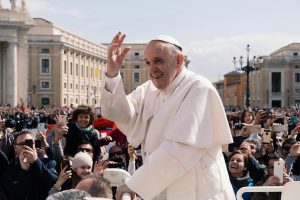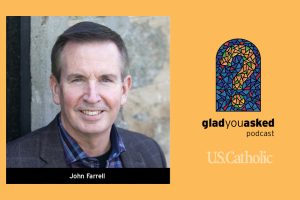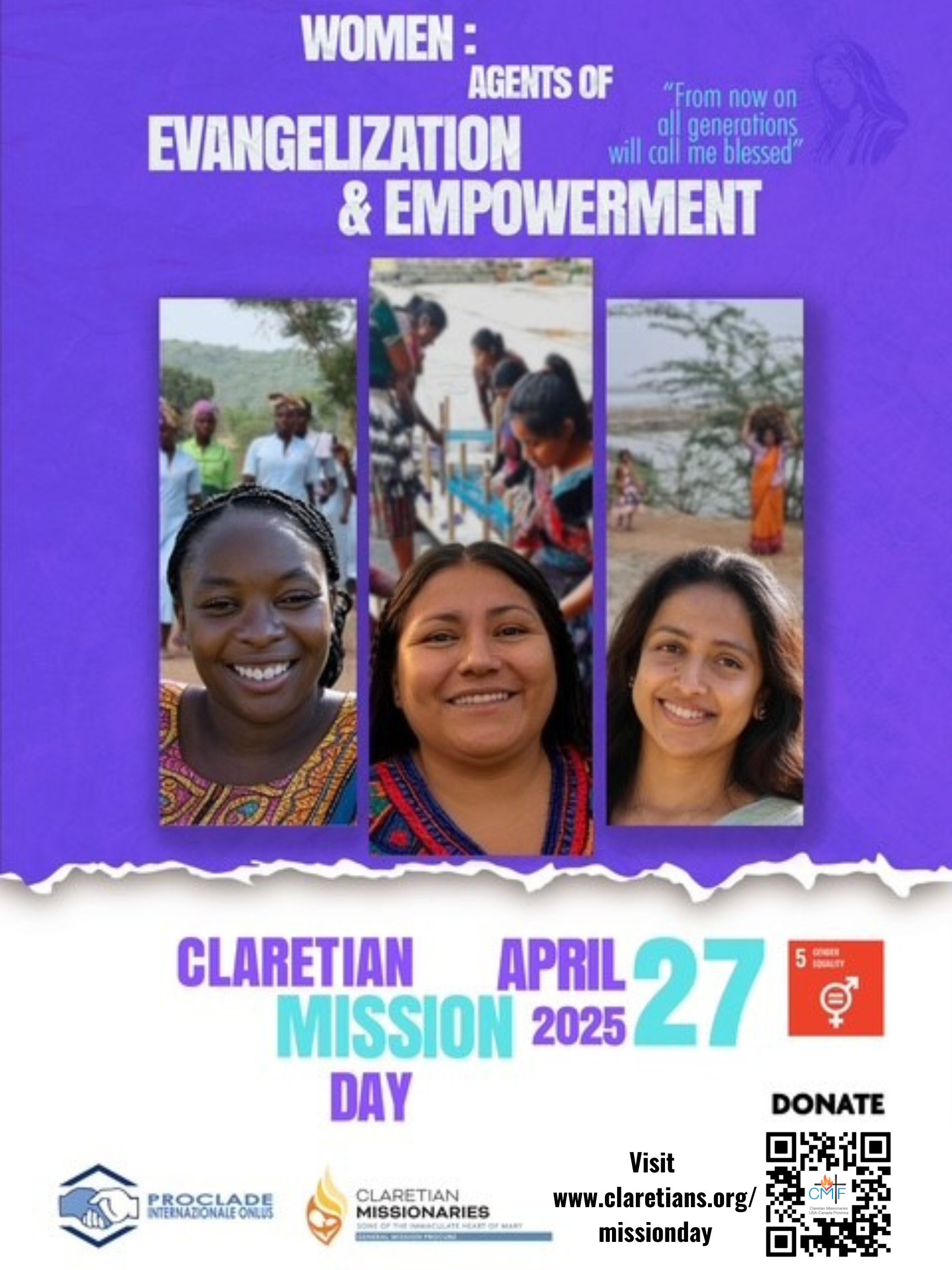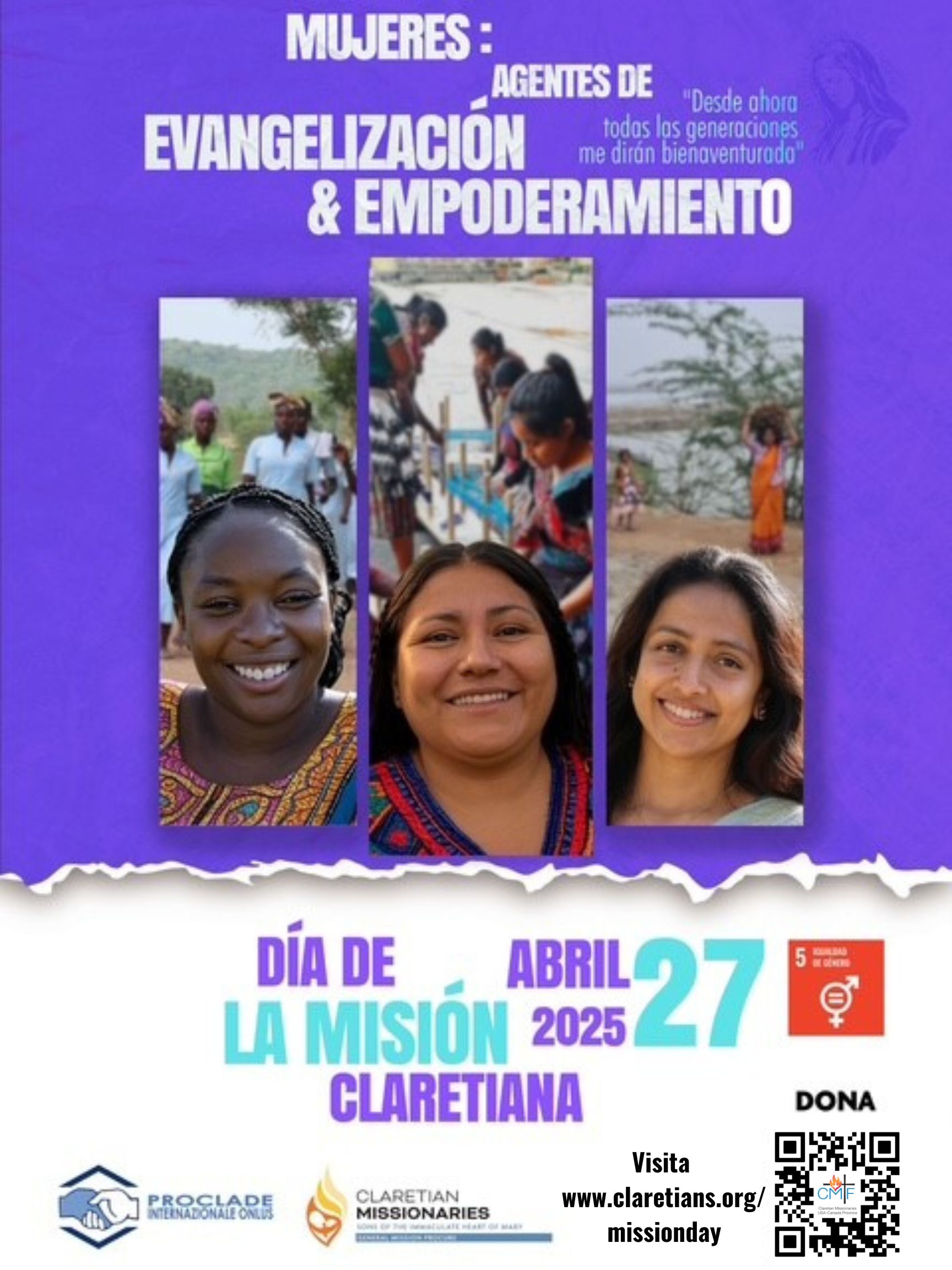The age of the universe alone requires us to talk about creation and Christ in new language. “The whole cosmos, from the big bang on, is that Word of God being spoken in the vast spaces of the universe.”
That same Word is made flesh in Jesus Christ, says Delio, a former professor of spirituality and now a research fellow at Georgetown’s Woodstock Theological Center. But he’s more than the man who walked from Galilee to Jerusalem 2,000 years ago. “Christ is probably the most inclusive term we could use to talk about God’s presence,” she says. “Christ is the one who draws together, who unifies the new creation,” she says.
That unity is simply the love of God that binds all things together, she says, and that’s where we come in. “While the fullness of God’s love is revealed in Jesus, what happened to Jesus must happen to us as well.”
Delio sees the Christian vocation as one of recognizing relationships, both to creation and to other human beings. For followers of Jesus, that means building bridges, especially across religious traditions. “Heaven takes place on earth when we begin to live in God’s love in a new way,” she says. “It can sound cosmic and abstract and yet, it’s the most concrete thing we can do.”
You write about the connection between science and theology. What does science have to do with our faith in Jesus?
Every age must discover Christ anew. When we make Christ an academic study or just a doctrinal formula, he loses his vitality and meaning for our everyday lives.
This especially matters now because the world has changed radically since Christians first started reflecting on who Christ is. Science has opened up for us the cosmos in a new way. Now we know that the cosmos is much older than we could have ever imagined—13.7 billion years old. We can’t get our minds around what even a billion years is like.
Science also reveals that the cosmos is dynamic. So if God is the creator of this cosmos, we’re talking about a very dynamic God, not a static, boring God. This is a God who is engaged and relational, a God of dynamic love.
These discoveries challenge us to rethink the meaning of Jesus Christ. Our traditional christology—the formal study of Jesus Christ—was formulated in the fourth and fifth centuries: Jesus Christ is true God and true man, fully divine and fully human without change, without confusion, without separation, without division, two natures in one person. The language is a mixture of the New Testament, Greek metaphysics, and Plato and Aristotle, which reflects an understanding of the universe as fixed and unchanging, not dynamic and evolving.
Does that mean we have to start all over?
We have a tradition to work from. If you look at the first six centuries of Christianity, the belief that the Word is made flesh was really tied with creation. In the New Testament, for example, Colossians and Ephesians point to Christ as the firstborn of creation. And the first thing that Christ is about is God’s love.
If you go back to the early Christian thinkers, to people such as Origen of Alexandria, Irenaeus of Lyons, or Maximus the Confessor, they write about the “primacy of Christ,” how Christ is first in God’s intention to love.
Franciscans later focused on Christ as God’s Word incarnate. God expresses God’s self in every aspect of created reality. So every person, every tree, every leaf, everything is a little word of the Word of God.
In that tradition we can talk of the whole cosmos, from the big bang on, as that Word of God being spoken in the vast spaces of the universe. And that’s not metaphor. Nothing would come to be except as an expression of God’s love.
What we’re saying is that from all eternity the whole universe is made for Christ. The whole thing is about love, from 14 billion years ago, to the emergence of the human person, to the incarnation in Jesus Christ. It’s love being stressed all along, divine love all through cosmic history.
It bursts forth in the person of Jesus like a new big bang. Big Bang One is the cosmos; Big Bang Two is God exploding now in human history and giving an explicit direction to the whole course of evolution in Jesus Christ.
How is Christian life different in this approach to Christ?
A “cosmic christology,” a more expansive understanding of Christ, is about relationship: God in relationship to us and us in relationship to God incarnate. To be related to the incarnation is to be related to one another and to all of creation. It means seeing the incarnation as the real presence of God in real time, in concrete material reality.
We tend to focus on the historical life of Jesus: He was a good man. He lived in Nazareth. He went about preaching the gospel, doing good things, healing the sick and raising the dead. We have this idea that if we dutifully follow the pattern of life Jesus laid down for us, we’re guaranteed salvation.
But to say Jesus is the Christ means that he is the long-awaited fullness of God’s presence. What is the point of God taking on our humanity if it doesn’t have meaning for us in our own humanity? The point is that just as Jesus is the Christ, we, too, are part of the Christ mystery, the Word-made-flesh, God’s love incarnate, which has evolved through 14 billion years. As theologian Raimon Panikkar said, Jesus is the Christ, but Christ is more than Jesus alone. Christ encompasses the whole cosmos.
Isn’t that pantheism?
Pantheism is the belief that God is all things and all things are God. The approach to Christ I am describing has been called panentheism: God is in all things, and all things are in God, but God is more than all things. God is greater than the sum of everything because God is incomprehensible. You can’t conflate the uncreated and the created.
Christ is the way we are called to live in this mystery of God’s love. As we live in it, Christ is born.
So we are all supposed to be Christ?
You are baptized, right? All who are baptized into Christ have put on Christ, Paul says in Galatians. By our baptism we are changed. We have put on Christ. We are now Christ. In other words Christ is now our life. We are to go out and make Christ alive in the universe.
St. Augustine said something along these lines in one of his sermons: “If you are the body of Christ and its members, it is your own mystery that has been placed on the Lord’s table; what you are receiving is your own mystery.”
How do we live the life of Christ?
That’s where I bring in the mystics. We’ve become too analytical. Our approach is about law: Do good, avoid evil. But the mystic is one who, through prayer, enters into the mystery of God as love. Christian life is first of all a mystery, the mystery that the incredible, incomprehensible love of God is the source of all that we are.
The mystical way is one of vision. The mystic moves from the head to the heart to see the world in its true reality. The mystic doesn’t do what is right out of duty, but because she or he sees the presence of God in the poor, in the sick, in those who are anxious, in the marginalized.
Incarnation is also about seeing the hiddenness of God. Francis of Assisi was very focused on the humility of God, who is hidden in everyday, ordinary reality. What do you see when you see another person? When you see a rabbit? A tree? A sand dune? Do you see only sand? Or do you see something more?
What does that mean for how we treat the rest of creation?
We tend to treat the earth sort of like a backdrop for our lives. A “cosmic christology” reminds us that every aspect of the cosmos is in Christ, everything is Word incarnate. Everything bears the infinite love of God, each in its own way, which means that there’s nothing earthly that doesn’t have some divine dignity to it.
The medieval Franciscan theologian St. Bonaventure said the whole world is exemplary of God because everything bears a relationship to God. God created the quark and the star, the bacteria, the snake. Everything reflects God in some way.
Because every created thing has a relationship to God, I can’t misuse, abuse, or control it. Cosmic christology calls us to be in relationship to created things as a sister or brother. We are all part of the one cosmic family.
Would you really abuse and misuse and manipulate a person or thing you claim to love? I hope not.
In that respect we have misused the things of the earth. We’ve been very selfish and self-centered, and we have not treated the rest of creation with a sense of dignity, respect, or reverence.
Understanding God in our midst in the natural world might give us a new consciousness that we use things as gifts. All of life—our life and every life—is a gift. That’s what love is about.
Does that mean God loves everything equally?
Another way to approach this is that each person, every single thing that’s created is created uniquely out of the infinite love of God, which means everything bears in its own unique, distinct way the reflection of God’s love.
When we talk about God’s love, the model is the Trinity. The first person of the Trinity, the Father or the fountain source of love, loves one other than the Father—the Son. That relationship between the Father and the Son is bound in a union of all things, the Holy Spirit.
In other words God’s love is uniquely and distinctly personal. God doesn’t love in some general diffuse way. Your life and my life and every single life is loved in a unique, personal, and distinct way. Everything bears a unique expression of God in a way that cannot be reproduced or clumped together, which makes everything uniquely lovable.
How do we start seeing with this broader vision?
The first thing is prayer. I don’t mean just saying prayers, such as the Our Father or Hail Mary. I mean really praying to know yourself first of all. In our very busy world we need to take time to be with God.
People say that they’re not sure how to pray, but prayer is really just talking that leads to deep dialogue. Do you talk to yourself? That’s part of prayer. Who are we talking to when we talk to ourselves? It’s God, the source of life within us.
Prayer is being at home with God in our everyday lives. Scripture can help us because it gives us some language and insight as to who God is. This is the ancient form of lectio divina. You read the scriptures and then you meditate. You let them sink in. We’re so busy today that we don’t even have time to let anything sink in, but there is no christology without that, quite honestly.
The next step is looking at the life of Jesus, at his healing, mercy, and forgiveness. The humanity of Jesus is our humanity. What he did in his life is what we’re capable of doing as well. We’re capable of being compassionate, of being merciful, of forgiving others.
Jesus sets the pattern for what makes salvation possible. And salvation is really being made whole. The common image of Jesus in the New Testament and the earliest Christian centuries was Jesus the physician. Salvation is better seen in terms of health.
To be saved is to respond to and accept the love of God in our lives, that grace of God that makes us whole. If we are whole, then what? We help make others whole as well.
Can you give some specific examples of what needs healing?
We still have divisions within our local communities and in the churches. We still have a lot of violence in the world. We have wars that continue to proliferate. We still have poverty abounding, probably more today than ever before. Why hasn’t Christianity made a difference in the world? How is it we can still have the same problems that Jesus had in his own time?
A lot of that has to do with the fact that we have not yet caught on to the heart of Christianity, which is very simply stated in Jesus’ own language: love of God, love of neighbor. Love is the essence of God’s incarnation.
G. K. Chesterton said, “The Christian ideal has not been tried and found wanting. It has been found difficult, and left untried.” That’s a pretty hard saying, but there’s truth to it. What if however many millions of Catholics there are really took up living as Christians by living the Christ mystery, by living in the fullness of love?
Whenever there is conflict or there’s division, can we forgive? Can we be merciful? Can we be compassionate? Can we love? Can we help bridge those divisions, that brokenness?
If I put this into practice, what does my life look like?
Say you meet a Muslim. You could respond, as some do, “You’re a Muslim. You’re probably going to go to hell because you believe in the Qur’an, and the Qur’an isn’t really the Word of God. That’s just a book.” You might also judge the person’s accent as too foreign, so you don’t have the patience to spend time trying to figure out what the person is talking about.
But if you say that God is love, the first thing you realize is that before you is an icon of Christ. This Muslim is one in whom God lives, which means you must be patient and show respect for and interest in that person. In this Muslim, God is revealing God’s self.
A mystical Christian encounters a person as an encounter with God. This is incarnation now. We allow that person to be who they are because that’s the person God created. I think it’s a matter of looking at the person as an icon of God—one in whom God is shining through.
Unfortunately, we don’t see people or the created world as icons. Instead we treat them as objects—an object you can manipulate and control.
You used the example of encountering a Muslim. How do other religions fit into this cosmic vision of Christ?
One thing we have to say is that other religions are not outside the Christ mystery. They are part and parcel of that mystery. That’s why dialogue with the world’s religions is very important. How will we build the bridges of God’s love unless we know other religions and their people?
We Christians are called to be bridge builders, and unless we do that, we are going to continue to suffer violence in the world because a lot of the violence is religious in nature. Christianity has the responsibility to incarnate the love of God by reaching out to other religions to talk about this mystery of God.
When you sit down face to face with another person and you start talking about the things that really matter, you’re going to find more things in common than things that divide. And I think when you find that bridge of commonality, there is Christ.
I think there is more good to discover in other religions than to be wary of. I think we would do better building bridges with that attitude.
And we each have role to play?
God seeks to be incarnate in an expanding incarnation. The Christ is waiting to be born anew, if I can put it in that language. But Christ cannot be born anew without our saying yes to bringing Christ into the world.
I also think we need to lighten up a little bit and enjoy the ride. Christian life is an adventure, God’s adventure in love. We need to recapture a sense of this cosmic adventure in love and that we’re part of it.
Science tells us that evolutionary creation will continue on earth for billions of years. The evolutionary universe may go on for 100 trillion years. A lot has happened before us, and a lot is going to happen after us. So stay tuned. I think in the next billion years, the best is yet to come.
This article appeared in the April 2011 issue of U.S. Catholic magazine (Vol. 76, No. 4, pages 18-21).













Add comment